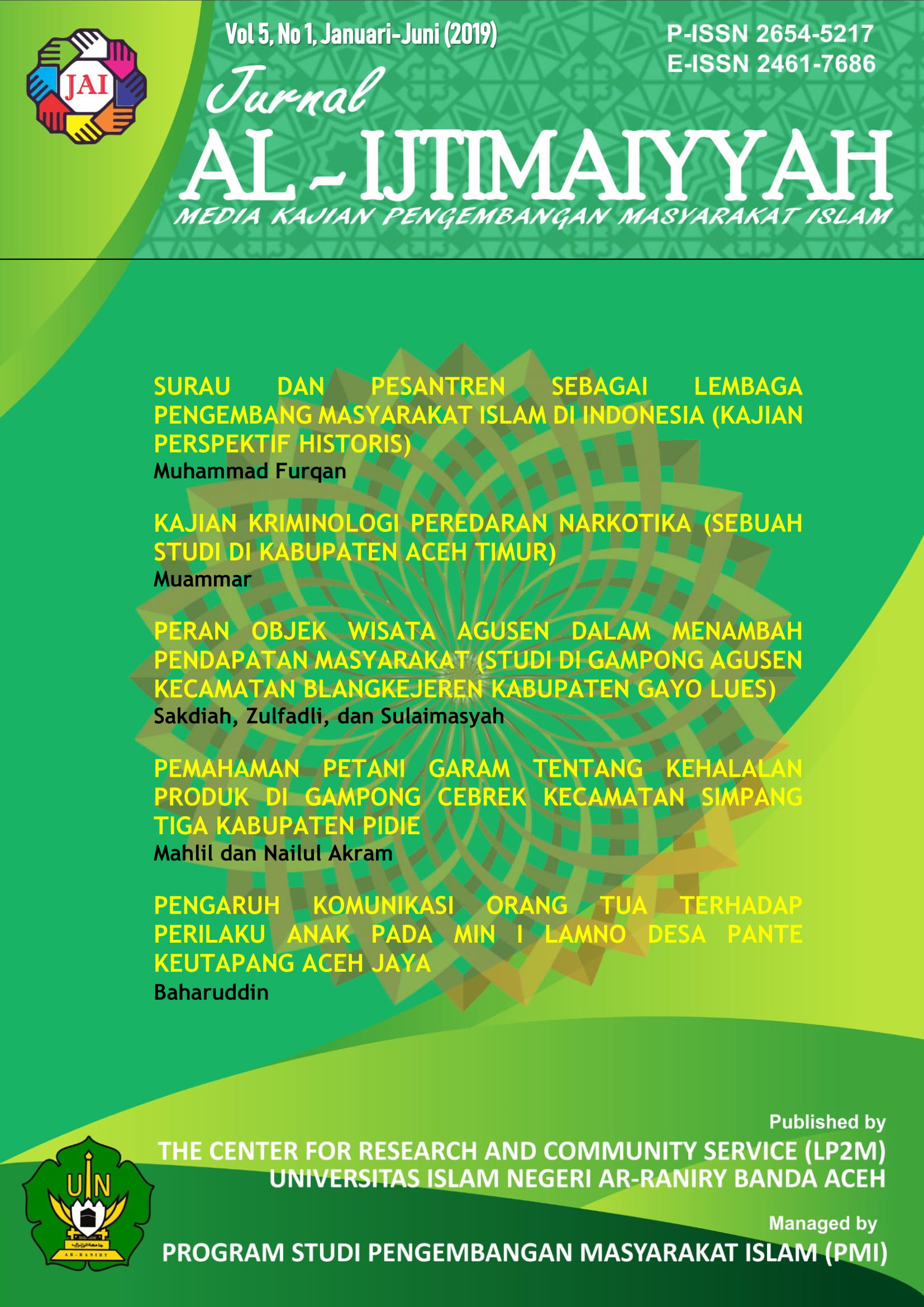PENGARUH KOMUNIKASI ORANG TUA TERHADAP PERILAKU ANAK PADA MIN I LAMNO DESA PANTE KEUTAPANG ACEH JAYA
DOI:
https://doi.org/10.22373/al-ijtimaiyyah.v5i1.4207Abstract
This study entitled the influence of parental communication on children's behavior at MIN 1 Lamno, Pante Keutapang Village, Aceh Jaya. Communication in the family is an important factor in determining the good and bad of children. If parents instill a good attitude towards children, such as being honest, noble, humble, brave, grateful for Allah's blessings, carrying out amar ma'ruf nahi munkar and so forth, the child will grow in honesty, formed with noble character, courage and implement amar ma`ruf nahi munkar. Thus, if communication within the family is harmoniously interwoven, the child will feel that he is very valuable, so that he will foster good attitudes and behavior in the child. The purpose of this study is to get an overview of the communication of parents with their children in Pante Keutapang Village, Aceh Jaya, knowing the inhibiting factors of parent communication with their children in Pante Keutapang Village, Aceh Jaya and to find out how far parent communication affects their children's behavior at MIN 1 Lamno Village Pante Keutapang Aceh Jaya. This study uses a qualitative method, where the researcher thoroughly examines the facts found in the research location in accordance with the focus of the problem, by examining directly, then the results of the analysis data are presented and given discussion. To get accurate and reliable data, the data collection technique is done through observation, interviews and documentation. The results of the study show that: (1) communication between parents and their children in Pante Keutapang Village, Aceh Jaya sometimes runs well, but there are still not good, so that it can cause concern and anxiety for each parent. Because this parent communication greatly influences the attitudes and behavior of the child outside the home such as school and community environment; (2) factors that hinder the communication of parents with their children in the village of Pante Keutapang Aceh Jaya is due to the demands of work (career) and economic demands; and (3) the influence of parental communication on their children's behavior at MIN 1 Lamno Pante Keutapang Village, Aceh Jaya is a change in the attitude of the child while at school, such as being unable to respect the teacher, always fighting with friends, often saying rude and so on, this will also have an impact on his performance.
Keywords: Influence, Communication, Children
References
A. Supraktinya, Komunikasi Antara Pribadi Tinjauan Psikologis, Jogjakarta: Kanisius, 1995.
A.S. Achmad, Manusia dan Informasi, Ujung Pandang: Hasanuddin University Press, 1990.
A.S. Achmad, Komunikasi Media Massa dan Khalayak, Ujung Pandang: Hasanuddin University Press, 1992.
Alex Sobur, Pembinaan Anak dalam Keluarga, Cet. II, Jakarta: BPK Gunung Mulia, 1996.
Alex Sobur, Komunikasi Orang Tua-Anak, Bandung: Angkasa, 1996.
Dali Gulo, Kamus Psikologi, Bandung: Tonis, 1982.
Daryanto, Kamus Bahasa Indonesia Lengkap, Surabaya: Apollo, tt.
Deddy Mulyana, Ilmu Komunikasi suatu Pengantar, Cet. III, Bandung: Remaja Rosdakarya, 2001.
Deddy Mulyana, Komunikasi Antar Budaya, Bandung: Remaja Rosdakarya, 1990.
Departemen Pendidikan dan Kebudayaan, Kamus Besar Bahasa Indonesia, Cet. I, Jakarta: Balai Pustaka, 1988.
Elizabeth B. Hurloch, Perkembangan Anak, Jilid II, Jakarta: Erlangga, tt.
Hafied Cangara, Pengantar Ilmu Komunikasi, Jakarta: Raja Grafindo Persada, 2000.
Hasan Alwi, Kamus Besar Bahasa Indonesia, Jakarta: Balai Pustaka, 2007.
Hasan Basri, Keluarga Sakinah, Cet. III, Yogyakarta: Pustaka Pelajar, 1997.
Hasan Langgulung, Azas-azaz Pendidikan ,Jakarta: Pustaka Al-Husna, 1998.
Ibrahim Amini, Agar Tak Salah Mendidik, Jakarta: Al-Huda, 2006.
Irwanto, Kepribadian, Keluarga dan Narkoba; Tinjauan Sosial dan Psikologis, Cet. III, Jakarta: Penerbit Arcan, 1990.
James G. Robbins, dkk., Komunkasi yang Efektif, Cet. III, Jakarta: Pedoman Ilmu Jaya, 1986.
Jhon M. Echol, et al, Kamus Inggris Indonesia,Cet. 13, Jakarta: Gramedia, 1996.
M. Alisuf Sabri, Psikologi Pendidikan, Jakarta: Pedoman Jaya, 1995.
M. Arifin, Hubungan Timbal Balik Pendidikan Agama di Lingkungan Sekolah dan Keluarga, Cet. IV, Jakarta: Bulan Bintang, 1978.
Mar’at, Sikap Manusia Terhadap Perbuatan Serta Pengukurannya, Jakarta: Ghalia Indonesia, 1982.
Maurice Balson, Bagaimana Menjadi Orang Tua yang Baik, Cet. II, Jakarta: Bumi Aksara, 1996.
Onong Uchjana Effendy, Dinamika Komunikasi, Bandunng: Remaja Rosdakarya, 1993.
Onong Uchjana Effendy, Ilmu, Teori dan Filsafat Komunikasi, Bandung: Citra Aditya Bakti, 2013.
Onong Uchjana Efferendy, Kamus Komunikasi, Cet. I, Bandung: Mandar Maju, 1989.
Pusat Pembinaan dan Pengembangan Bahasa Departemen Pendidikan Nasional Republik Indonesia, Pedoman Umum Ejaan Bahasa Indonesia yang Disempurnakan dan Pedoman Umum Pembentukan Istilah, Cet. V, Bandung: Pustaka Setia, 1996.
Pius A. Partanto, dkk., Kamus Ilmiah Populer, Surabaya: Arkola, 1994.
R. Soetarno, Psikologi Sosial, Yogyakarta: Kanisius, 1993.
Saiful Bahri Djamarah, Pola Komunikasi Orang Tua dan Anak dalam Keluarga, Jakarta: Rineka Cipta, 2004.
Sarlito Wirawan Sarwono, Pengantar Umum Psikilogi, Jakarta: Bulan Bintang, 1984.
Singgih D. Gunarsa, Psikologi Praktis Anak, Remaja dan Keluarga, Jakarta: BPK Gugun Mulia, 1995.
Sven Wahlroos, Komunikasi Keluarga, Cet. II, Jakarta: Gunung Mulia, 1999.
W.J.S. Poerdarminta, Kamus Umum Bahasa Indonesia, Cet. II, Jakarta: Balai Pustaka, 1982.
Downloads
Published
Issue
Section
License
Authors who publish in Jurnal Al-Ijtimaiyyah agree to the following terms:
- Authors retain copyright and grant the journal right of first publication with the work simultaneously licensed Attribution-ShareAlike 4.0 International (CC BY-SA 4.0) that allows others to share the work with an acknowledgment of the work's authorship and initial publication in this journal.
- Authors are able to enter into separate, additional contractual arrangements for the non-exclusive distribution of the journal's published version of the work (e.g., post it to an institutional repository or publish it in a book), with an acknowledgment of its initial publication in this journal.
- Authors are permitted and encouraged to post their work online (e.g., in institutional repositories or on their website) prior to and during the submission process, as it can lead to productive exchanges, as well as earlier and greater citation of published work. (See The Effect of Open Acces)











